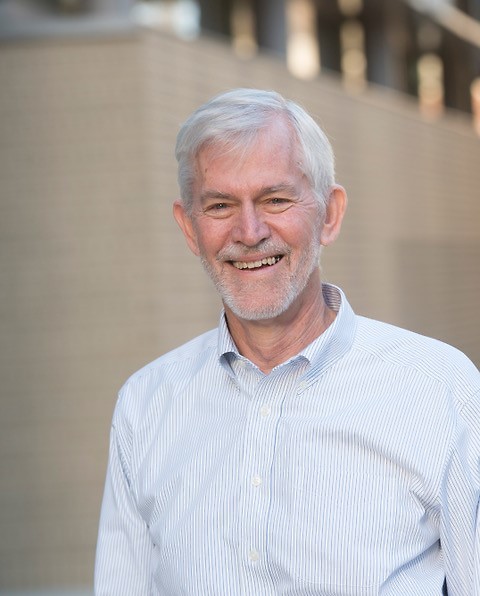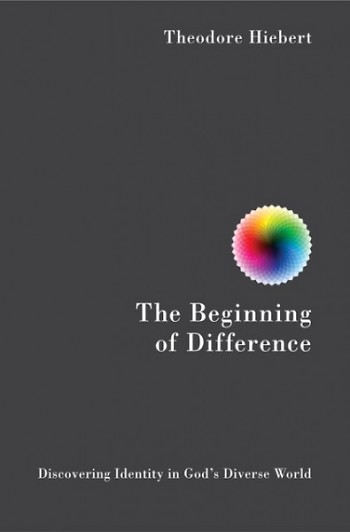written by Doug Kindschi, Director, Kaufman Interfaith Institute, GVSU
“Difference can be a source of vast enrichment and growth — or a reason for hate, exclusion, discrimination, and violence. … The stakes of difference are high.” So writes Ted Hiebert, Professor Emeritus at McCormick Theological Seminary, in his recently published book, “The Beginning of Difference: Discovering Identity in God’s Diverse World.”
Our understanding of difference is critical in these days of racial discrimination, fear of immigrants and refugees, political polarization, and even hate. Religious differences as well contribute to anti-Semitic and Islamophobic attitudes and actions.
Hiebert received his doctorate at Harvard University and taught there as well as at Gustavus Adolphus College, Boston College and St. John’s University. At McCormick he was the professor of Old Testament, one of the editors and translators of the Common English Bible, and wrote commentaries on Genesis for multiple publications.
He explores the issues of identity and difference in the book of Genesis as well as in the contemporary scene. In today’s world, identity and difference are frequently defined by religion and skin color. Our history and early texts help form our current attitudes, and Hiebert explores the origin stories of difference as expressed in the biblical book of Genesis.
The various Genesis authors seek to understand identity and meaning for the emerging Hebrew people. The famous story of the “Tower of Babel” as recorded in Genesis 11 has often been interpreted as a story of human pride and God’s punishment. Hiebert wants us to look at this short passage with new eyes. This familiar story, comprising just nine verses, is in two distinct parts. The first four verses describe the people taking bricks and mortar to build a city and a “tower with its top in the sky, and let’s make a name for ourselves.”
Hiebert notes that there is nothing in these verses that indicates pride. Rather, it as a story about a people seeking to create and preserve their own cultural identity. He writes, “I believe the beginning of the story of Babel is dealing with … (an) important human experience — the need for meaning, belonging, and identity that can only come from being a member of a common cultural tradition.” He sees it as recognizing the fundamental need for social identity that is common to all of us.
The reference to building a tower, which some translations describe as “reaching to the heavens,” could also be translated as “reaching to the sky.” Hiebert, a Hebrew language scholar as well, prefers this latter translation and notes that it does not imply pride but just that it would be very tall, much as we might describe a “skyscraper.”
Thus, the first part of the story represents the normal and appropriate desire to find identity in one’s community and culture.
The second part of the story, verses 5-9, describes God’s response. While the people were constructing a single culture, God introduces multiple cultures. Hiebert writes, “God introduces difference. How we understand what God intended and what God did when God brought difference into the world will have everything to do with how we understand the message of this story about difference.”
A common language is a primary marker of a distinct culture, and God brings a diversity of language in order to introduce multiple cultures. The story tells us how God mixes the languages so they cannot understand each other. Some translations describe this as God “confuses” their language, while other translations use the work “mixes” or “mingles” their languages. Hiebert prefers this latter translation since it is more neutral. There is nothing in the text about this being a punishment; it is just the action taken. It is one of the ways God creates multiple cultures.
The story goes on to say that God scatters them across the earth. Geographical location is another marker of a culture and thus God creates difference in both language and common living space.
In these origin stories recorded in Genesis we find insights that can inform the issues of today. The drive for identity and common cultural affiliation is a natural human need. But the reality is that we live in a world of many cultures. We can choose to see this as threatening or we can see it as a reality ordained by God.
It is natural to seek identity with those we see as having something in common, and certainly language and living space are important parts of that commonality. We often also seek our identity with those with whom we share religion, political ideas, professional interests, hobbies, etc. These identities can be very useful and healthy. But when the identities become overbearing and exclude those with different identities they can become hurtful and even lead to hate and violence.
In the current political environment it is important to recognize that seeking identity is a natural desire. Yet our country is founded on diversity and throughout our history this struggle has led to conflict between various ethnic and religious groups. Catholics, Jews, Irish, Asians, Muslims, Blacks and others have all been subjected to discrimination and prejudice because of their identity. By understanding our scriptures, as well as the aspirations at our country’s founding, we can see more clearly the vital role of diversity in our world.
Based on the reading of our religious origin stories, we see the different cultures and identities as a part of God’s plan for diversity. This insight can lead to understanding, acceptance, and peace. Hiebert writes, “The drive toward identity and solidarity is a distinctively human impulse, and the emergence of difference as a distinctively divine choice. … Difference is God’s idea.”
In these days of division and hatred, let us embrace difference in order to learn, grow and find meaning in the rich variety of identities. “Difference is God’s idea.”
The Rapidian, a program of the 501(c)3 nonprofit Community Media Center, relies on the community’s support to help cover the cost of training reporters and publishing content.
We need your help.
If each of our readers and content creators who values this community platform help support its creation and maintenance, The Rapidian can continue to educate and facilitate a conversation around issues for years to come.
Please support The Rapidian and make a contribution today.

